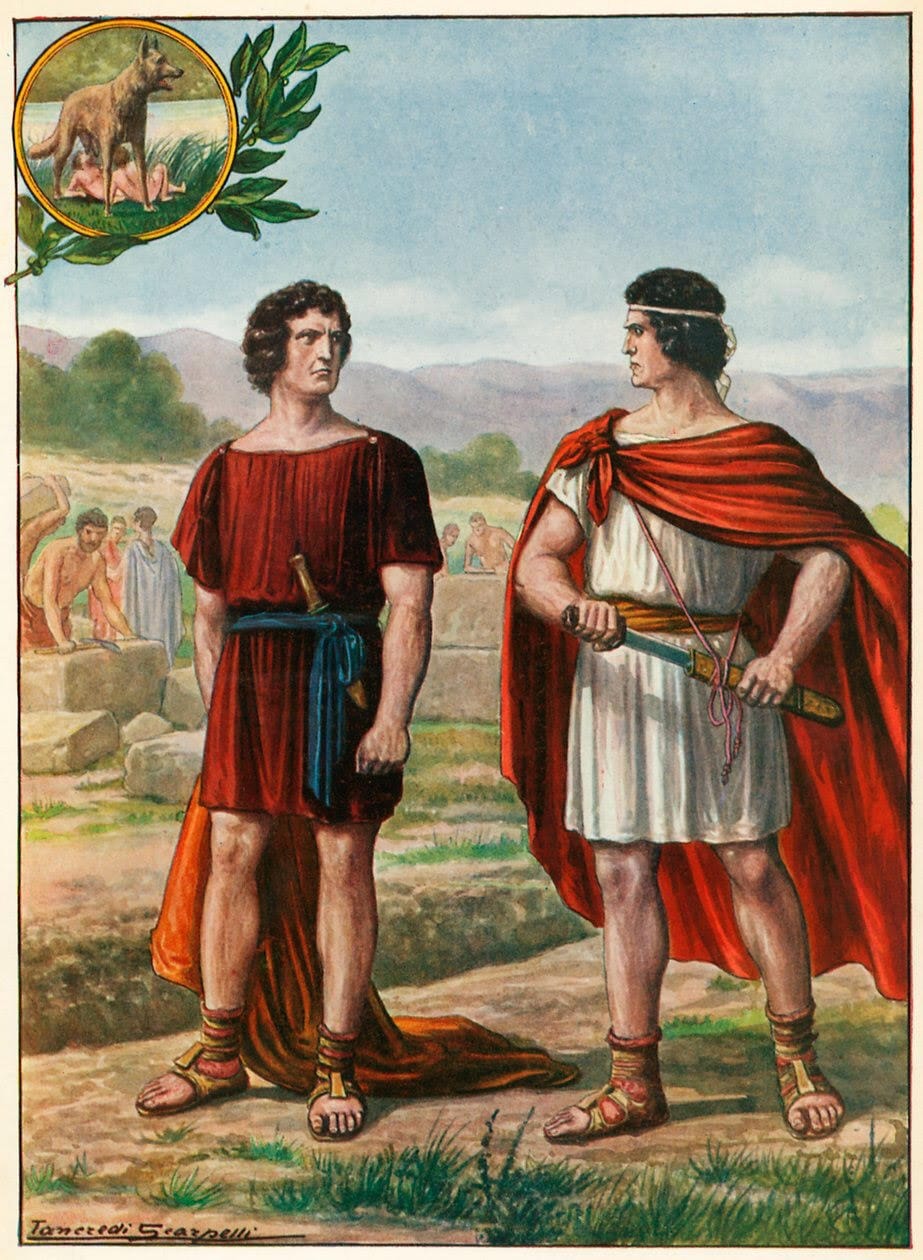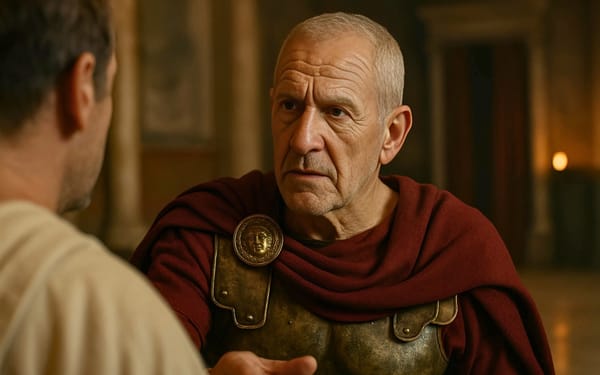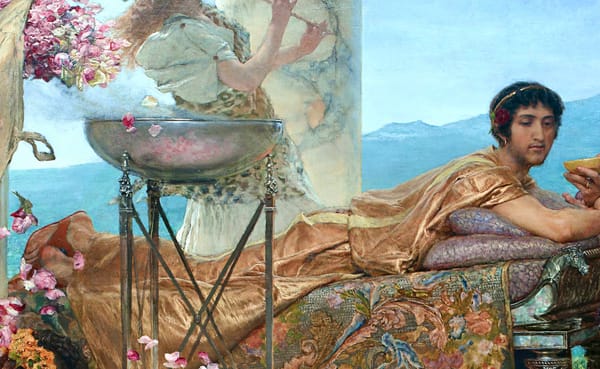Why did Romulus kill Remus? The tragic tale of the Founders of Rome
A legend that everybody knows about Remus and Romulus, the founders of Rome.

The legend of Romulus and Remus is central to Roman mythology, capturing themes of rivalry, destiny, and the divine mandate to rule. The story of why Romulus killed Remus, as recorded by the ancient historian Livy, is complex and with two variations. Still, it dives deep into the complexities of power, legitimacy, and the violent origins of Rome and the Roman Empire.
According to the myth, Romulus and Remus were the twin sons of Rhea Silvia, a Vestal Virgin, and Mars, the god of war. Their birthright was fraught with danger as their great-uncle, King Amulius of Alba Longa, sought to eliminate them to secure his throne. The twins were abandoned by the River Tiber, but fate intervened. A she-wolf nurtured them until they were discovered and raised by a shepherd and his wife. This miraculous survival story set the stage for their eventual rise to power.
As young men, Romulus and Remus aspired to found a city at the site where they were saved by the she-wolf. However, their shared vision soon led to a conflict over who would be the sole founder and ruler. The brothers agreed to seek the gods' will through augury—interpreting the flight of birds to determine divine favor. Romulus chose the Palatine Hill, while Remus opted for the Aventine Hill. The augury results were ambiguous and disputed, with each brother claiming the gods' favor.
What has Livy written about the twin brothers in The History of Rome?
According to Livy's account, each brother prepared a sacred area on their respective hills and began observing the birds in the sky. The augury would determine that the brother who saw the most birds had secured divine support for their plans. Remus reported seeing six birds, while Romulus claimed to have seen twelve, asserting that this meant the gods favored his chosen site. Remus disagreed, arguing that he saw the birds first and thus had the gods' approval.
This disagreement led to a standoff, with both brothers and their followers quarrelling. Romulus began constructing walls and digging trenches around his site on the Palatine Hill. Remus mocked his brother's efforts and, on one occasion, even jumped over the walls, making fun of Romulus' work and efforts.
Romulus is portrayed as an effective leader ready to showcase his strength, initially creating a positive impression of his actions. This impression serves as an introduction to Livy's account of Romulus's founding of Rome. Every Roman reader would have known that this founding coincided with the killing of Remus, making this episode a significant test case for evaluating Livy's depiction of Romulus.

Livy begins by describing the optimism surrounding the entire endeavor, with Romulus and Remus both eager to establish a city where they had grown up (cupido . . . urbis condendae, 1.6.3). However, their plans are disrupted by the same evil that had plagued their grandfather (avitum malum), specifically the desire for absolute power (regni cupido), leading to a disastrous conflict (foedum certamen) after a promising start. This transition from the twins' shared desire to found a city to their individual ambitions to rule it alone has clear negative moral implications (malum, foedum), suggesting that the events of this episode might serve as an exemplum.
The critical moment occurs through a series of intransitive or passive verbs that obscure who is ultimately responsible for Remus's death. Livy describes the scene in a way that, when translated literally, reads: “Then, having come together with an argument, they are turned to killing by the conflict of their angers; there in the crowd, Remus, having been struck, fell” (Inde cum altercatione congressi certamine irarum ad caedem vertuntur; ibi in turba ictus Remus cecidit, 1.7.2).
The different versions of Remus’ murder
There are multiple versions of how Remus met his end. Livy claimed that the gods killed him for not observing the auguries and respecting the divine signs, so the gods struck him dead for his hubris. Livy suggested that Remus' death indicated that the gods favored Rome, possibly to exonerate Romulus since he was considered Rome's first ruler.
Other versions state that Romulus murdered his brother. In most accounts, including that of the Greek historian Dionysus, Romulus killed Remus with either a spade or a spear. According to St. Jerome, Remus was killed by one of Romulus' supporters. Regardless of the specific circumstances, almost all versions attribute Remus' death to Romulus in some way, suggesting it was fated by the divine. Interestingly, all sources indicate Romulus was at least partly responsible for his twin's death, and it was considered an act of divine will. The fratricide is widely believed to have occurred on the day of Rome's foundation, April 21, 753 BC.
Livy however, has yet another version of the event, which is deemed as the most popular and historically accurate, but does not follow the same path as his previous description:
"Volgatior fama est ludibrio fratris Remum novos transiluisse muros; inde ab irato Romulo, cum verbis quoque increpitans adiecisset, ‘Sic deinde, quicumque alius transiliet moenia mea,’ interfectum."
“The more commonly known story is that Remus, in mockery of his brother, leapt over the new walls; thereupon he was killed by an angry Romulus, after he had added, chiding him also with words, “So be it, then, for whoever else will leap over my walls.”
Titus Livius, "The History of Rome" (perhaps originally titled Annales, and frequently referred to as Ab Urbe Condita, meaning From the Founding of the City)

Thus, Livy presents us with two different accounts of Remus' death, each with slight variations, and leading to a different conclusion as to Romulus actually being the murderer or not.
As we saw in the first account, Livy describes, “then followed an angry altercation; heated passions led to bloodshed; in the tumult Remus was killed", which suggests a rather abrupt and chaotic event without much elaboration. This version indicates that maybe Romulus kills Remus in the chaos but does not detail the exact manner of the killing, making it seem less gruesome.
On the other hand as we aforementioned, the second and more well-known account from Livy states, “The more common report is that Remus contemptuously jumped over the newly raised walls and was forthwith killed by the enraged Romulus, who exclaimed, 'So shall it be henceforth with every one who leaps over my walls". This version is more direct and detailed, showing Romulus as enraged, possibly the murdering hand, and justifying his action as a defence of his newly founded city.
Livy may have chosen to present the incident quickly and without much emotional language to downplay the gravity of Romulus killing his own brother. By describing Remus as acting "contemptuously", Livy implies that Remus was disrespectful, and Romulus' reaction was somewhat justified. The abruptness of the account might indicate Livy's attempt to convey that such actions were necessary for the greater good of Rome, reflecting the Roman attitude toward law and order.

..."then followed an angry altercation; heated passions led to bloodshed; in the tumult Remus was killed"
Livy, Ab Urbe Condita/Photo: Livy by Midjourney
The lack of burial for Remus
The differing versions highlight the ancient Roman perspective that augury and divine will were paramount, and actions against these signs were punishable. Remus' death, regardless of its exact circumstances, was seen as a divine endorsement of Romulus' authority and the foundation of Rome.
Livy's accounts suggest that the Romans might not have seen Remus' death as regrettable because it was perceived as a necessary act to establish and defend Rome. The lack of mention of a proper funeral or burial for Remus could imply that his death was considered justified and not worthy of further attention, even though Roman culture typically placed importance on burial rites and respect for the dead.
Valerie Hope in his book ‘Memory and Mourning: Studies on Roman Death”, suggests that "rituals, customs, and expectations surrounding death suggest that memory, individual and personal, as well as collective, did matter to many people", indicating that respecting the dead was an essential aspect of Roman culture. However, the absence of such details in Livy's account might reflect the exceptional nature of Remus' death in the context of Rome's foundation myth.









About the Roman Empire Times
See all the latest news for the Roman Empire, ancient Roman historical facts, anecdotes from Roman Times and stories from the Empire at romanempiretimes.com. Contact our newsroom to report an update or send your story, photos and videos. Follow RET on Google News, Flipboard and subscribe here to our daily email.
Follow the Roman Empire Times on social media: